Have a lovebird as a pet and want to know how to add some extra variety to its diet? Or are you thinking of getting an Agapornis and trying to figure out what foods they can eat? Great! A proper diet is one of the most important factors in keeping any parrot happy and healthy.
I often get asked about various “human” foods and whether lovebirds can eat them. Let’s have a look at the 16 foods that I receive the most questions about and whether they make a good option for a lovebird snack.
This post contains affiliate links. If you make a purchase, a small percentage will go directly to Psittacology at no additional cost to you. Thank you for supporting Psittacology!
Can lovebirds eat human snacks?
Lovebirds can absolutely eat human snacks! Well, some human snacks, that is. As we all know too well, many human foods are processed and can be especially salty, fatty, or sugary, which could prove to be detrimental to our birds.
Here, we’ll discuss several foods that lovebirds can safely eat that you’ll probably already have in your pantry. We’ll also go into a few that are unsafe and should definitely be avoided.
If you’d like more information about what constitutes a healthy Agapornis diet, don’t forget to also have a look at the full article on parrot food & diet.
Tip: Fresh produce should make up a significant portion of your lovie’s diet. Have a look at the posts on fresh veggies for lovebirds and fresh fruits for lovebirds to find out which are safe!
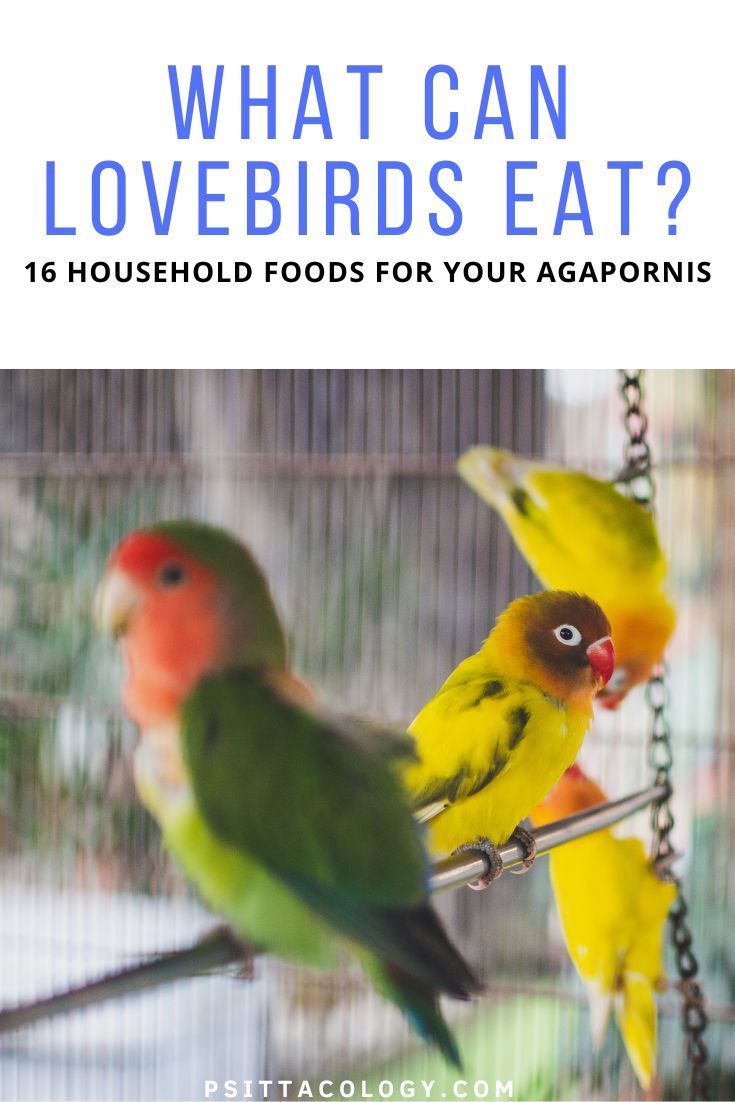
16 safe foods for lovebirds
Can lovebirds eat rice?
Lovebirds are naturally seed eaters, and rice happens to be a type of grass seed. So yes, your lovie can eat rice! Steam or boil rice without salt and mix it with some fresh chopped veg for a super-healthy lovebird lunch.
Although white rice is fine, brown or black rice (also known as forbidden rice) are best. Because they still have (part of) the husk, they’re higher in fiber and other nutrients than their white counterpart.
Can lovebirds eat boiled eggs?
I know it sounds a bit strange to feed egg to a bird, but eggs actually make a nutritious addition to your lovebird’s diet. You can feed them boiled (feel free to leave some of the eggshell on) or baked (without oil).
Generally, lovebirds don’t need much extra protein, so you can offer some egg once a week or so. This may be different for broody females, who will appreciate the extra nutrients as their bodies work hard to produce their own eggs.
Can lovebirds eat popcorn?
Although salted and buttered microwave popcorn definitely doesn’t make for a suitable lovebird snack, plain popcorn is actually a healthy choice. In fact, some parrot food brands actually carry popcorn treats, so you don’t even have to pop your own.
If you do like making your own popcorn, you can put a few kernels aside to share with your bird. Have a look at Psittacology’s parrot popcorn recipe! Sprinkle with herbs like dried basil if you want to add some color and flavor.
Can lovebirds eat walnuts?
Sure, your lovebird can have some walnut. Like all nuts, they’re very fatty and you shouldn’t overfeed them, but they also contain a variety of nutrients that are good for your bird.
To compensate a bit for the high fat level in a walnut, you can take an unshelled one and crack it in half. Leave the shell on and offer it to your lovebird like this. It’ll have to work to dig out the good stuff, stimulating its smart brain and helping to burn off some of those calories as it works for its treat.
Can lovebirds eat bread?
Technically speaking, lovebirds can safely eat bread. That being said, though, most breads, like white bread, have very little nutritional value for our birds.
Instead, small bits of whole-wheat bread can be given to lovebirds as an occasional treat. Just don’t make it a habit! As much as they love crunchy pieces of toast, it’s just too processed and not nutritious enough to be fed as a staple.
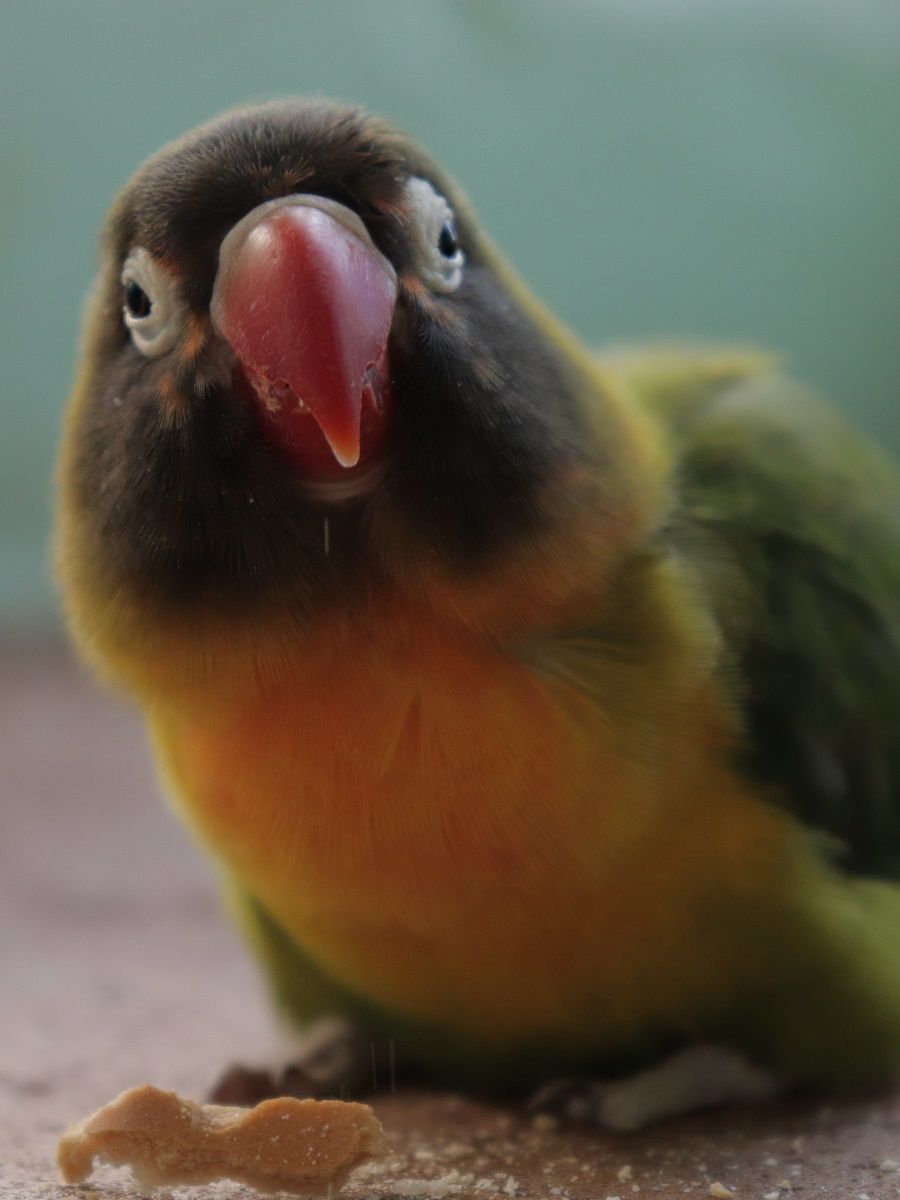
Can lovebirds eat cashews?
Your lovebirds will likely love cashews, but they are high in fat and should only be fed as an occasional treat. And only raw and unsalted cashews, at that! You should be able to find these at your local health food store.
Cashews do actually have many important nutrients for lovebirds. They contain iron, magnesium, vitamin K, and vitamin B6, as well as protein and fiber.
Can lovebirds eat chia seeds?
Yes. If you’re making some chia pudding, be sure to offer your lovebird a few of the seeds. They have all the same benefits for parrots that they do for humans. Because your lovebird is “programmed” to eat seeds, even the most reluctant eaters are likely to tuck right in.
Your lovebird can also eat soaked chia seeds, but make sure they’re soaked in water or sugar-free plant-based milk rather than cow’s milk. Unsweetened fruit juice would also work well.
Can lovebirds eat sesame?
Sesame seeds can be a great addition to a lovebird’s meal. Just sprinkle a small pinch of unsalted sesame seeds on top of their food for a good source of both protein and healthy unsaturated fat. Both black and white sesame seeds are fine.
Keep in mind that moderation will, of course, be key. Sesame seeds do have a fair amount of fat. This can eventually add up and result in weight gain and, ultimately, obesity. Our feathered friends are unfortunately pretty prone to getting fat!
Can lovebirds eat almonds?
Yes, almonds are a delicious treat for lovebirds. They can be served both raw and roasted, so long as they are unsalted. They are high in protein, calcium, and fiber.
Lovebirds would benefit from having the almonds chopped into smaller pieces due to their fat content. You can give these little slivers as training treats or just to tell your lovie that you love them too.
Can lovebirds eat sunflower seeds?
Can they ever! If there’s one food your lovebird is guaranteed to be willing to sell its soul for, it would be sunflower seeds. They just love everything about these snacks, from the fun activity of cracking the shells to the fatty seeds inside.
You can offer sunflower seeds to your lovebird as a snack or training treat, but don’t use them as a daily staple food. They’re too high in calories for this. Be sure to avoid salted sunflower seeds.
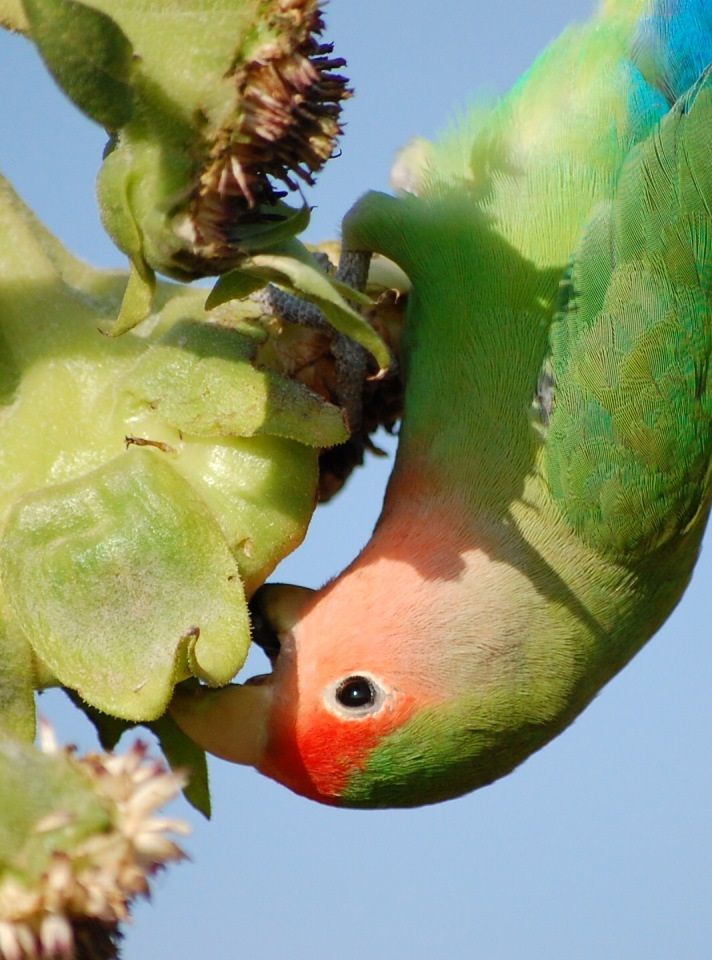
Can lovebirds eat pumpkin seeds?
Just as they can eat unsalted sunflower seeds, lovebirds can also eat pumpkin seeds. This is another high-fat snack, so not something to feed large amounts of, but pieces of pumpkin seed make for great training treats.
Feed pumpkin seeds with the shell on to encourage foraging behavior. In fact, if you’re preparing some pumpkin at home, you can offer some of the “innards” (stringy bits) with the seeds mixed in. It’s all safe for your lovie to eat and a fun enrichment option.
Can lovebirds eat pistachios?
Yes! Unsalted pistachios make for a great little lovebird snack. They’re high in fat like all nuts, so shouldn’t be fed in large amounts (no more than one at a time), but they also contain all sorts of important (micro)nutrients.
My favorite option is to feed unshelled pistachios. Your bird will have to figure out how to open the shell with its strong beak to get to the tasty nut inside. This helps keep it busy for longer and mimics how it would have to work for its food in the wild.
Can lovebirds eat peanut butter?
Just as they can eat unsalted peanuts, lovebirds can also eat peanut butter. All-natural peanut butter has been gaining popularity in the past few years, so you can buy a sugar-free, no-additive peanut butter to share with your feathered friend.
Keep in mind that peanut butter is very high in fat, so your lovebird shouldn’t have more than a pea-sized amount from time to time. You can smear it on fresh fruits and veggies to encourage your bird to try them, or use tiny amounts as training rewards.
Can lovebirds eat oatmeal?
Dried, prepared, rolled, steel-cut… oats and oatmeal come in many different forms, and pretty much all of them are fine for a lovebird to eat. You can absolutely sprinkle some oats over your bird’s chop or other daily meals.
If you want to feed prepared oatmeal, be sure to make it with water or unsweetened plant-based milk rather than cow’s milk. Remember to clean your lovebird’s beak after feeding time (or encourage it to do so itself), because dried oatmeal is very difficult to remove!
Can lovebirds eat mealworms?
You may think of mealworms as something to be fed to cold-blooded pets of the reptile kind, but actually, parrots can eat them too. Wild parrots will absolutely scoop up any bug they come across, so you could give your lovebird a fresh or freeze-dried mealworm or two to try as well.
It’s commonly said that you should crush live mealworm heads before you feed them. It’s very unlikely a mealworm will bite your lovebird’s tongue, but you can still do so with a pair of tweezers if you just want to be sure.
Can lovebirds eat cereal?
This one depends on the type of cereal you’ve got on hand. Your lovebird won’t keel over if it eats a Froot Loop, and you can share half a loop without issue, but sugary cereals like this aren’t the best choice.
If you like to eat more natural cereal brands, like cornflakes without added sugar or Weetabix (which contains very little sugar), your lovebird can have some for breakfast alongside you. Just check the ingredients to make sure there’s little or no sugar, and no sugar replacements.
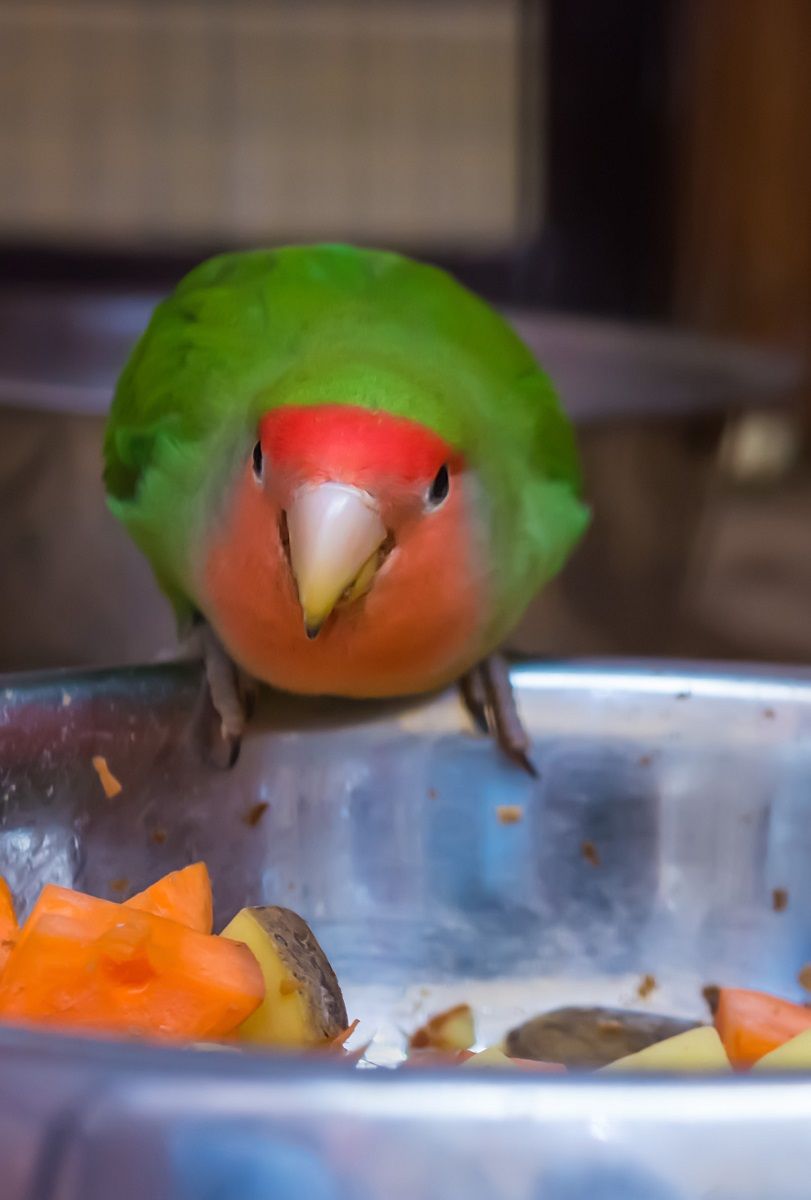
4 unsafe foods for lovebirds
Can lovebirds eat cheese?
Lovebirds should not eat cheese. In most cases, it will lead to an upset stomach, a cranky bird and sometimes even diarrhea.
Soft cheese especially are high in a sugar called lactose which, like many humans, lovebirds just can’t digest properly. Cheese is also high in salt and sodium, which can result in electrolyte imbalances and dehydration in lovebirds and other parrots.
Can lovebirds eat avocado?
No! Like most animals, lovebirds can become severely ill if they eat avocado. This is likely due to the presence of a toxin called person.
In a 1989 study, avocado was force-fed to 16 birds, of which 7 died within two days. No avo toast for your lovie, please.
Can lovebirds eat honey?
Unfortunately, honey, especially raw honey, can be dangerous for lovebirds. When raw and unprocessed, honey may contain Clostridium botulinum, a bacterium that can lead to botulism. This is also why you shouldn’t give honey to babies.
Botulism is a serious respiratory illness that, unfortunately, often turns deadly. So it’s best just to give honey a miss in favor of other treats!
Can lovebirds eat chocolate?
Unfortunately, you can’t share chocolate with your lovebird. As with most pets, it’s toxic to them due to a compound called theobromine. This is present in particularly high concentrations in dark chocolate.
Unlike many unsafe foods, which are more likely to cause an upset stomach than kill your bird, chocolate can actually be fatal. Keep it away from curious beaks at all times.
Can lovebirds eat meat?
While technically omnivores, meaning that they can eat foods from plant sources and foods from animal sources, lovebirds in nature don’t naturally eat meat.
If you are looking for ways to increase their protein intake, like for a laying bird that needs extra nutrients, a few bites of boiled egg or a few freeze-dried mealworms should be sufficient along with their daily food.
Frequently asked questions
Yes, your lovebird can eat seed mixes or pellets marketed for budgies. Both are seed eaters whose diets in the wild are pretty similar.
Yes, they can also eat food marketed for cockatiels, as these are also seed eaters that prefer a similar diet to lovebirds.
Conclusion
Overall, there are loads of different foods that lovebirds can eat that are beneficial to them. Remember to introduce new foods slowly, and only offer treats in moderation.
From chia seeds to popcorn and even mealworms, there are so many ways to incorporate different healthy foods into our lovebirds’ diets. Remember, a healthy and varied diet is the key to a happy and long-lived parrot!
Sources & further reading
Hargis, A. M., Stauber, E., Casteel, S., & Eitner, D. (1989). Avocado (Persea americana) intoxication in caged birds. Journal of the American Veterinary Medical Association, 194(1), 64-66.
Tanzi, M. G., & Gabay, M. P. (2002). Association between honey consumption and infant botulism. Pharmacotherapy: The Journal of Human Pharmacology and Drug Therapy, 22(11), 1479-1483.
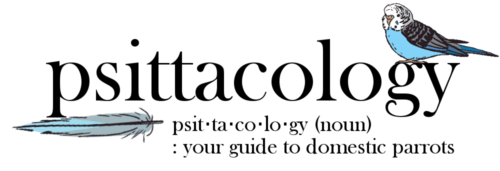
Cool!
I’m hand rearing 2 lovebirds and I am wanting them to enjoy fresh veggies.
And fruit in moderation.
Good on you, feeding a healthy diet from the start is so much easier than trying to get a bird to accept veg and fruit at a later stage. Check out the posts on vegetables for parrots and fruits for parrots! They list a whole bunch more that are safe for lovebirds also 🙂 Good luck.